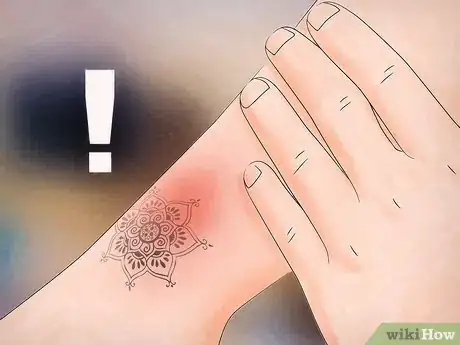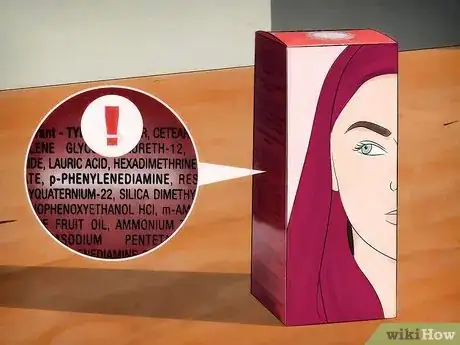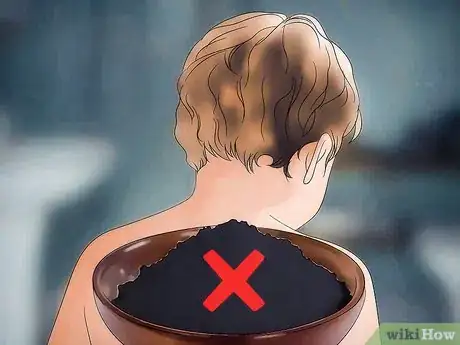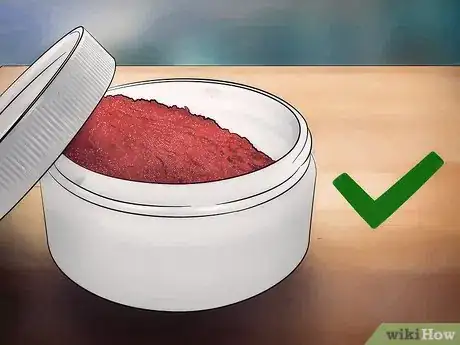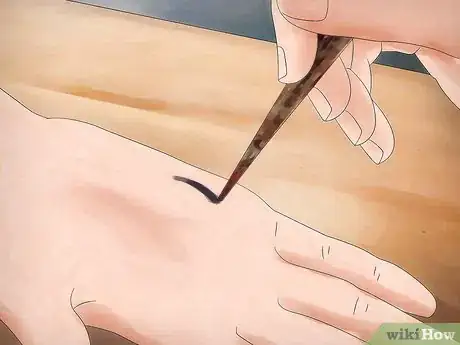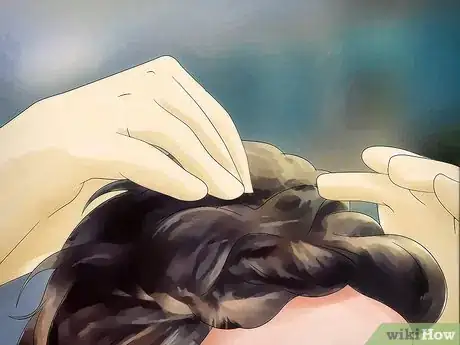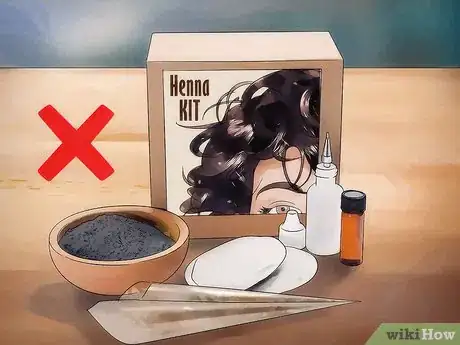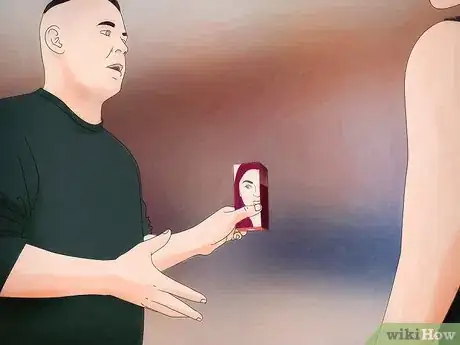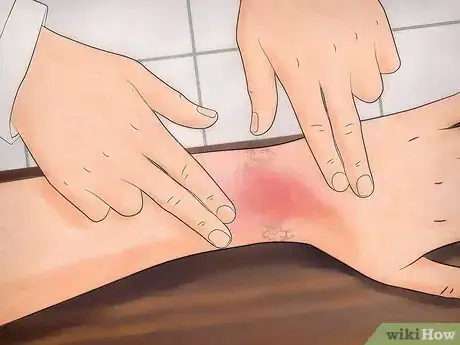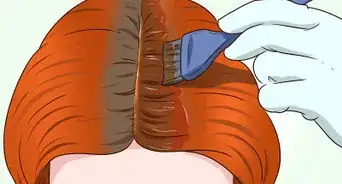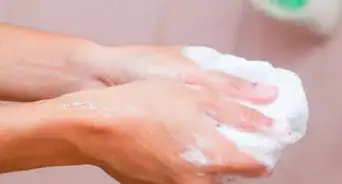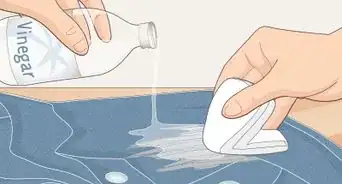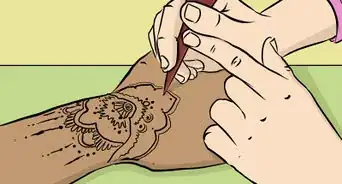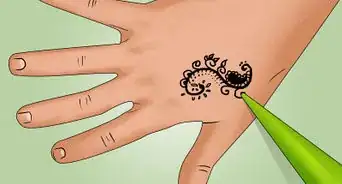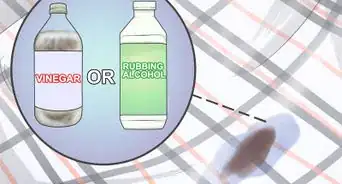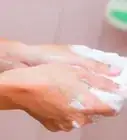X
This article was co-authored by Moushami Iyer. Moushami Iyer is a Henna Artist and the Owner of Pastel Zenna, an art store in Chicago featuring Moushami's specialty in blending Zentangles and Henna. With over five years of experience, Moushami specializes in Henna tattoos, Henna-inspired art, woodwork, and offers Henna parties.
This article has been viewed 46,917 times.
Henna is used for body art or hair dye. There are, however, some serious risks involved with using henna. The use of “black henna” should be avoided.[1] You should never use henna on children, and you should report all side effects to a medical professional.
Steps
Method 1
Method 1 of 2:
Understanding the Risks
-
1Understand that using henna on your skin or hair is not necessarily safe. The Food and Drug Administration, or FDA, has received multiple reports from consumers who experienced long-lasting and severe side effects from the application of henna for temporary tattoos. Side effects include, but are not limited to, red lesions that are raised and weeping, loss of pigmentation of the skin, blisters, increased sunlight sensitivity, redness, and permanent scarring.
- These reactions can occur immediately after getting a temporary tattoo using traditional red henna or "black henna."
- Reactions from temporary henna tattoos can also occur up to two or three weeks after receiving the tattoo.
- You can also experience adverse side effects from hair dye that contains “black henna.”
-
2Read product labels carefully. If you are purchasing henna to use at home on your skin or hair, make sure you examine each ingredient listed on the label. Avoid any color additives in henna dyes to be used on the skin. If you are getting a henna tattoo from a tattoo artist or your hair dyed by a professional, make sure you inquire about the ingredients in the dye they will use on your skin or hair.
- Ask specifically about the inclusion of p-phenylenediamine, or PPD, and avoid getting a tattoo with this additive.
Advertisement -
3Avoid using henna on all children. Children can be particularly sensitive to henna. Skin sensitivities and allergic reactions to henna can occur in children.[2]
- Children with glucose-6-phosphate dehydrogenase deficiency are at particular risk, as applying henna to the skin of children with this condition can cause a life-threatening condition called hemolysis.
- Seek immediate medical attention if a child with glucose-6-phosphate dehydrogenase deficiency has been exposed to henna.
Advertisement
Method 2
Method 2 of 2:
Using Henna Safely at Home
-
1Avoid using “black henna” on your skin or hair. Some manufacturers produce inks marketed as “black henna” that might be a mix of traditional henna and additional ingredients.[3] Many, however, mix henna with coal tar hair dye that contains p-phenylenediamine, or PPD. PPD is not intended to be applied to human skin. It is not permitted to be used in cosmetics for skin in the U.S., as it can cause dangerous skin reactions.
- While inks marketed as “black henna” create tattoos that are darker and last longer than those created with traditional henna, these dyes are harmful and should be avoided.
- Black henna is actually banned in some countries.[4]
-
2Use red, or traditional, henna. Red henna is generally safe when applied to the skin. Staining the skin reddish-brown, traditional henna can be safely used for body art. Red henna does, however, carry the risk of rare instances of reactions ranging from contact allergy to hypersensitivity.[5]
-
3Perform a patch test. Before using henna to dye your hair or create body art, make sure you conduct a patch test. Apply a very small amount of the henna to a tiny patch or skin or swath or hair. Wait at least fifteen minutes before removing. If you experience any adverse side effects, such as redness or irritation, you should not use henna on your skin or hair.
-
4Wear gloves when applying henna to your skin or hair. When applying a traditional henna to your skin or hair, be sure to wear gloves. This will prevent the dye from making its way to unwanted places and help create a sanitary application process.
-
5Avoid purchasing henna kits for home use. Department and specialty stores often sell kits that contain supplies for creating henna tattoos at home. These can contain caustic chemicals that are unsafe for use on human skin, such as kerosene, metal salts, benzene, lead, and artificial dyes, and should be avoided.[6]
-
6Get a henna tattoo from a reputable professional. If you do make the decision to get a henna tattoo, you should seek out a reliable professional with experience. Seek out a professional who has a good reputation in your community, has been practicing the art for an extended period of time, and who uses pure henna. Be sure to ask for a full disclosure of ingredients in the henna they will use for your tattoo.
-
7Seek professional medical help if you experience side effects. If you experience any side effects from a henna tattoo or hair dye, please seek medical attention immediately. While side effects from red henna are rare, they can still occur and necessitate a visit to your medical provider. Reactions to “black henna” tattoos are more common, with as many as 2.5% of people experiencing a contact allergy to p-phenylenediamine, or PPD.[7]
-
8Report adverse reactions to the Food and Drug Administration. MedWatch, the Food and Drug Administration’s problem-reporting program, can be reached by calling 1-800-332-1088. Contact MedWatch if you have an adverse reaction to body art or tattoos created with traditional henna or “black henna.”
Advertisement
Expert Q&A
-
QuestionWhat is the safest henna to use?
 Moushami IyerMoushami Iyer is a Henna Artist and the Owner of Pastel Zenna, an art store in Chicago featuring Moushami's specialty in blending Zentangles and Henna. With over five years of experience, Moushami specializes in Henna tattoos, Henna-inspired art, woodwork, and offers Henna parties.
Moushami IyerMoushami Iyer is a Henna Artist and the Owner of Pastel Zenna, an art store in Chicago featuring Moushami's specialty in blending Zentangles and Henna. With over five years of experience, Moushami specializes in Henna tattoos, Henna-inspired art, woodwork, and offers Henna parties.
Henna Artist Original henna is natural and usually safe. Dry henna is dark greens, wet henna is dark brown/green. Henna is often mixed with essential oils to enhance the color/stain it leaves on skin.
Original henna is natural and usually safe. Dry henna is dark greens, wet henna is dark brown/green. Henna is often mixed with essential oils to enhance the color/stain it leaves on skin. -
QuestionCan henna be dangerous?
 Moushami IyerMoushami Iyer is a Henna Artist and the Owner of Pastel Zenna, an art store in Chicago featuring Moushami's specialty in blending Zentangles and Henna. With over five years of experience, Moushami specializes in Henna tattoos, Henna-inspired art, woodwork, and offers Henna parties.
Moushami IyerMoushami Iyer is a Henna Artist and the Owner of Pastel Zenna, an art store in Chicago featuring Moushami's specialty in blending Zentangles and Henna. With over five years of experience, Moushami specializes in Henna tattoos, Henna-inspired art, woodwork, and offers Henna parties.
Henna Artist Yes! You have to watch out for artificial products and additives such as red and black henna.
Yes! You have to watch out for artificial products and additives such as red and black henna. -
QuestionIs it safe to buy a henna tattoo kit from Walmart?
 HoldencaulfieldCommunity AnswerIn its natural form, henna is an amazing dye that has been used for thousands of years. It is best to buy henna from a reputable source - typically directly from a middle eastern/south Asian store or from a trusted online source. Black henna is not natural - henna is a powder made from a plant that usually produces a brown/orange/red tint. Using black henna is dangerous because it has many added chemicals, including some that are also found in hair dye.
HoldencaulfieldCommunity AnswerIn its natural form, henna is an amazing dye that has been used for thousands of years. It is best to buy henna from a reputable source - typically directly from a middle eastern/south Asian store or from a trusted online source. Black henna is not natural - henna is a powder made from a plant that usually produces a brown/orange/red tint. Using black henna is dangerous because it has many added chemicals, including some that are also found in hair dye.
Advertisement
References
- ↑ Moushami Iyer. Henna Artist. Expert Interview. 12 July 2021.
- ↑ https://www.ncbi.nlm.nih.gov/pubmed/23782354
- ↑ Moushami Iyer. Henna Artist. Expert Interview. 12 July 2021.
- ↑ Moushami Iyer. Henna Artist. Expert Interview. 12 July 2021.
- ↑ https://www.ncbi.nlm.nih.gov/pubmed/23782354
- ↑ http://www.mountainmehndi.com/a_guide_to_safe_henna_black_henna_warning
- ↑ https://www.ncbi.nlm.nih.gov/pubmed/23782354
About This Article
Advertisement

